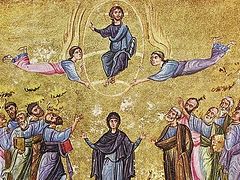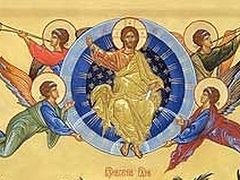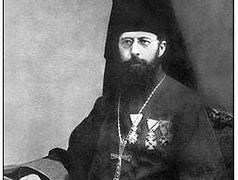Every Christian feast is the recollection of an event that left its unique mark on the history of the Church and mankind, an event that is still significant to this day and, as they say, “relevant” for any person. It’s true: Everything the Lord ever did in the days of His earthly life, everything that happened after His Crucifixion, burial, and Resurrection, everything that His disciples and the disciples’ disciples did for the glory of Christ, is directly related to the life of us all—both believers and those far from God, both those who clearly understand and those who are not conscious of this reality.
 The Ascension of the Lord. Mid-11th C. Fresco from the Transfiguration Cathedral of the Mirozhsky Monastery in Pskov
The Ascension of the Lord. Mid-11th C. Fresco from the Transfiguration Cathedral of the Mirozhsky Monastery in Pskov
But without faith and understanding, how can we perceive what the Lord wants to give us, what the Church seeks to convey to us through time and space? After all, it’s true that not only faith is needed here, but understanding is also necessary… If we don’t understand, for example, the essence of this or that feast, if we don’t understand how it concerns us personally, if we feel neither joy nor any movement of the soul when it comes, then how can we celebrate? Just go to the service, “as usual,” pray, and return home—feeling that something is off, that some cell of our heart, so in need of being filled up, remains empty?
It happens, and often. That’s why during the homily you don’t just try to explain the essence of the feast, but to bring it closer to those listening to you, to help them to understand what it means precisely for them, and wherein lies its joy—for everyone.
And, of course, one of the feasts in need of such an explanation more than many others is today’s Ascension of the Lord. It’s so easy to understand what we celebrate on Pascha, on Pentecost, on the Nativity of Christ or the Annunciation of the Most Holy Theotokos… But on Ascension? The Lord, appearing to the apostles over the course of forty days, instructing and comforting them, the Lord Whom their eyes saw and their hands felt (cf. 1 Jn. 1:1), ascends to Heaven and disappears from their sight. The One they could always come to, turn to, to Whom they could pour out their sorrow, from Whom they found the resolution to all of their confusion, Who rebuked them for their lack of faith and their timidity and at the same time confirmed them in faith and filled their hearts with courage, disappears … And He no more walks the roads of Palestine as a poor wanderer, having nowhere to lay His head but at the same time healing the hopelessly sick, liberating the possessed from demonic oppression, and resurrecting the dead.
There’s a sense of loss, sorrow, even abandonment of some kind. Where is the joy here and where is the feast? What feelings filled the hearts of the apostles when they stood on the spot where the Lord had led them before, beholding the blue heavens receiving Him? We can only guess, imagining what we ourselves would have experienced at that moment. And, most likely, these guesses wouldn’t be unfounded. We see so much that is familiar to us—human, infirm, ours!—in Christ’s disciples before the day of Pentecost, before the appearance of the Comforter.
Just before the Ascension they asked Him again: Lord, wilt thou at this time restore again the kingdom to Israel? (Acts 1:6).
Then He’s already gone, and there is no “restoration of the kingdom,” which they were waiting for, no matter what. How could they not experience loss? The question posed to them by the angels who appeared to them at that time implicitly affirmed this loss: Ye men of Galilee, why stand ye gazing up into Heaven? (Acts 1:11).
But their following words contained consolation, and hope, and the expectation by which all Christians are to live from that moment: This same Jesus, Which is taken up from you into Heaven, shall so come in like manner as ye have seen Him go into Heaven (Acts 1:11).
Our life is full of sins, wrongs, injustices—everything is amiss in it. Sometimes it seems meaningless, and sometimes unbearable. But everything changes in an amazing way when we suddenly feel the reality of this promise: He shall come in like manner… We feel it on the day of the feast of the Ascension, listening to its hymns, reading the end of the Gospels of Mark and Luke and the first chapter of the Acts of the Apostles, and also when we simply remember this event, which has already taken place, and about that which will certainly take place.
The Lord ascends, as the Gospel says, blessing them. And this blessing was not taken away from and will never be taken away from those who await His Second and glorious Coming and prepare for it with their entire lives; from those Whom he gave such a striking promise in His power: I am with you always, even unto the end of the age (Mt. 28:20)—a promise, which, being understood by the mind and accepted by the heart, never allows the Ascension to be treated as a parting.



